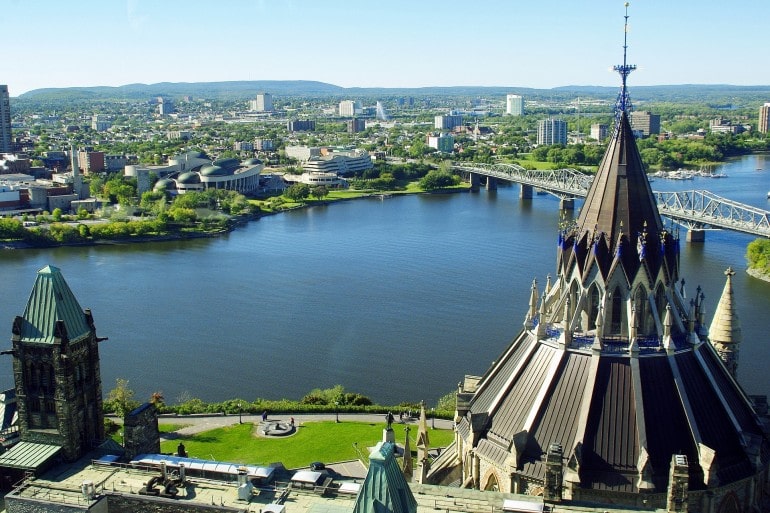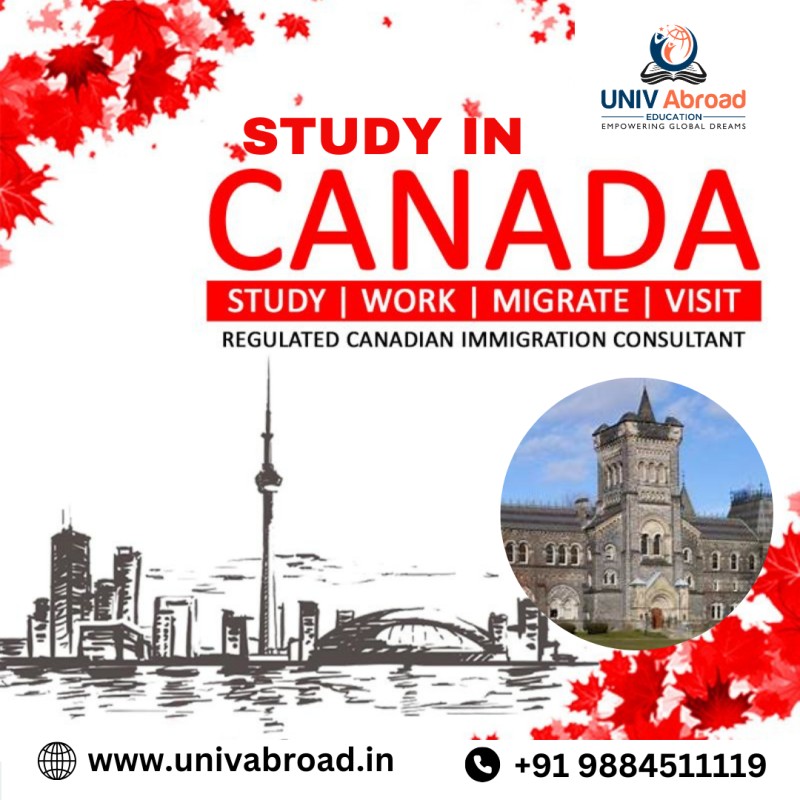
WHY STUDY IN CANADA from India?

Study in the CANADA
Study in Canada: Canada is one of the best study destinations for students in the world offering high-quality education at an affordable fee structure with degrees that are recognized worldwide.
Canada has seen a steady increase in education and tourism in the last few years. For nine consecutive years, the UN survey claimed Canada to be among the top three places in the world to live. The country is a peace-loving, friendly, caring and secure society.
Students who want abroad education recognize the value proposition it offers—high-quality institutions at an attractive price in a safe, beautiful, multicultural, progressive, and welcoming atmosphere. They lap up Canada’s excellent combined offer of high-quality education with opportunities for working both while and after studying and a chance to possibly immigrate after the completion of studies.
Why Study In Canada?
Top Most Reasons Why You Choose To Study In The CANADA?
1. A high-quality education in world-class institutions: A Canadian degree, certificate, and diploma is considered equivalent to the degrees in other Commonwealth countries and the US. Canada’s universities maintain high standards of academic excellence and are consistently recognized in top international rankings. 26 of Canada’s universities rank in the QS World University Rankings 2019 and 27 of them in the World University Rankings 2019.
2. Wide range of programs and courses to choose from: The Canadian universities offer more than 10,000 undergraduate and graduate degree programs, as well as professional degree programs and certificate courses. Students can also choose to pursue various workshops, short courses, and upgrades for skilled workers and professionals side by side with their main degree program. Some institutions offer specialized courses from a wide range of fields like fisheries, agriculture, apiary, paramedical technology, telecommunications, medicine, agriculture, computer technology, business studies, and environmental sciences.
3. Low cost of education: Tuition fees for foreign students in Canada are the lowest compared to the US, UK, and Australia. Fees for bachelor’s degrees at US public universities are almost 1/3 higher than at Canadian universities. Compared to private universities in the US, fees in Canadian universities for undergraduate programs were found to be less than half.
4. Multiple scholarship opportunities: The Canadian government as well as various private and public organizations offer multiple scholarships in Canada and bursaries opportunities to deserving international scholars which would help to build their future in the country as they recognize that international students bring fresh ideas to Canada and contribute a great deal to various disciplines and the industry with the knowledge they bring from their home countries.
5. A safe and peaceful atmosphere: Canada is a relatively safe and peaceful country. The Global Peace Index consistently ranks Canada among the top 10 safest countries to visit in the world. It is also relatively unaffected by natural disasters. The country provides students with a very welcoming and friendly atmosphere to live and study.
6. Multicultural country with deep democratic values: Canada is a country of immigrants and follows a policy of fostering multicultural diversity. Canadian society comprises almost all of the world’s ethnic groups. You will easily find the most ethnic foods and cultural activities. People of Canada are generally very open-minded and respectful of different perspectives.
7. Easier visa acquisition: One of the most exciting aspects while considering studying in Canada is that the process of acquiring a Canadian study visa. It is relatively relaxed and therefore attracts thousands of international students every year.
8. An exciting and beautiful place to live: There is great diversity in the landscape of Canada as it is a large country situated near the Arctic Circle surrounded by three oceans (the Pacific, Atlantic, and the Arctic). Canadian cities are famous worldwide for their beauty and picturesque landscape which attracts a large number of tourists every year. You can experience several cultural festivals and exciting events here like The Montreal International Jazz Festival, “Poutine Week” – The blend of French fries, delicious gravy, cheese curd, etc.
Top 10 Universities for Foreign Study in Canada are
Top Universities to study in Canada
BACHERLORS University IN Australia
- University of Waterloo
- Simon Fraser University through Fraser International College
- University of Victoria
- University of Manitoba
- University of Manitoba through International College of Manitoba
- University of Guelph
- Memorial University of Newfoundland, Grenfell Campus
- University of Windsor
- University of New Brunswick
- Brock University
- Wilfrid Laurier International College
- Wilfrid Laurier University
- Lakehead University, Orillia
- Lakehead University, Thunder Bay
- Lakehead University through Georgian College, Barrie, Ontario
- Trent University
- University of Winnipeg
- Toronto Metropolitan University
- Toronto Metropolitan University through Toronto Metropolitan International College
- St. Francis Xavier University
- University of Northern British Columbia
- University of Regina
- Laurentian University
- Ontario Tech University
- University of Prince Edward Island
- Thompson Rivers University
- Acadia University
- Fairleigh Dickinson University, Vancouver, Canada
- Mount Allison University
- MacEwan University
- Nipissing University
- University of Lethbridge
- University of Lethbridge through International College Calgary
- Mount Saint Vincent University
- Royal Roads University
- Cape Breton University
- Trinity Western University
- British Columbia Institute of Technology
- Vancouver Island University
- University of the Fraser Valley
- Kwantlen Polytechnic University
- Sheridan College - Davis Campus (Brampton)
- Sheridan College - Hazel McCallion Campus (Mississauga)
- Sheridan College - Trafalgar Campus (Oakville)
- Sheridan College - Davis Campus (Brampton)
- St. Thomas University
- Seneca Polytechnic
- Conestoga College - Doon Campus
- Conestoga College, Cambridge
- Conestoga College, Waterloo
- Algoma University
- George Brown College, Casa Loma
- George Brown College, Waterfront
- Douglas College
- Capilano University
- Southern Alberta Institute of Technology
- Langara College
- Fanshawe College
- Georgian College
- Niagara College
- Durham College
- Saskatchewan Polytechnic, Regina
- Vancouver Community College
- St. Lawrence College, Kingston
- St. Lawrence College, Brockville
- St. Lawrence College, Cornwall
- Yorkville University
- Selkirk College
- Cambrian College
- University Canada West
- North Island College
- Justice Institute of British Columbia ( JIBC )
- King’s College (University of Western Ontario)
- College of the Rockies
- Medicine Hat College
- Northern College
- Lakeland College
- Keyano College
- LaSalle College, Vancouver
- Crandall University
- Acsenda School of Management
- George Brown College, St. James
- International Business University (IBU)
- University of Niagara Falls, Canada
MASTERS University IN CANADA
- University of Waterloo
- University of Victoria
- University of Manitoba
- Memorial University of Newfoundland
- University of Windsor
- University of New Brunswick, Saint John
- University of New Brunswick
- Brock University
- Wilfrid Laurier University
- Lakehead University, Thunder Bay
- Trent University
- St. Francis Xavier University
- University of Northern British Columbia
- University of Regina
- Laurentian University
- Ontario Tech University
- University of Prince Edward Island
- New York Institute of Technology, Canada
- Thompson Rivers University
- Fairleigh Dickinson University, Vancouver, Canada
- Nipissing University
- Mount Saint Vincent University
- Royal Roads University
- Cape Breton University
- Trinity Western University
- British Columbia Institute of Technology
- Vancouver Island University
- Adler University
- University Canada West
- Crandall University - Sussex
- Providence University College
- Crandall University
- International Business University (IBU)
- University of Niagara Falls, Canada
Eligibility criteria for Admission in CANADA Universities
The general criteria for application are mentioned below:
English Requirements
• The minimum TOEFL score required by most universities is 80-84 (internet-based test) for PG courses
• Most universities and colleges accept equivalent IELTS and PTE Academic scores
Undergraduate study in Canada
• Universities in Quebec require a minimum of 13 years of secondary school education, i.e. an additional year of formal education after the 12th standard or intermediate degree. But, if your academic credentials are very impressive, some universities may consider your application even with 12 years of education
• Minimum aggregate marks of 70% in 12th grade for bachelor’s degrees, and above 50% for diplomas and advanced diplomas
• Mathematics in class XII (a prerequisite for some sciences, technology, and business courses)
• Minimum required IELTS/PTE Academic scores with an overall score of 6.0 bands or equivalent PTE scores
Masters in Canada
• Most universities require a qualification equivalent to a Canadian bachelor’s degree, which requires 16 years of formal education. It would mean another year of education after an Indian bachelor’s or a four-year bachelor’s degree course like B.E., B.Tech. or other such courses.
• Minimum required IELTS / PTE Academic scores with a minimum score of 6.5 bands as an overall score for a PG Diploma and 7.0 bands for a master’s degree. Some universities accept equivalent PTE scores too.
• Relevant work experience (some universities require this for MBA and Master’s Degree in IT)
Doctorate in Canada:
• Masters’ Degree in the particular subject you wish to pursue a doctorate program

